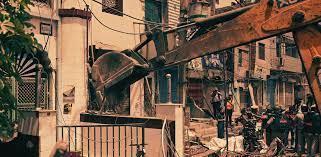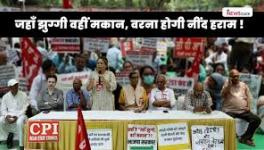With bulldozers seemingly becoming the new symbol of State-sanctioned speedy justice in different parts of India, and the trend of demolition of the property of supposed criminals by government agencies without any due process becoming increasingly normalized, it becomes pertinent to examine the legality of such demolitions.
Can the State demolish property of offenders as punishment for criminal offences?
The short answer is no. Criminal offences can only be punished with the punishments legally prescribed for those offences. There is no criminal statutory provision in the country at present that prescribes the demolition of an offender’s house as a penalty for any offence.
Therefore, the rhetoric being employed by Bharatiya Janta Party politicians that the recent demolitions in Madhya Pradesh, Gujarat and Delhi are in response to the occupants of the demolished properties participating in communal clashes in these places, has no legal basis.
Offences against public tranquillity, which includes rioting and promoting conflict between different social groups, are punishable under the provisions of Chapter VIII of the Indian Penal Code [IPC]. None of the sections in this chapter provide for the demolition of property as punishment for the offences enumerated therein.
Criminal offences can only be punished with the punishments legally prescribed for those offences. There is no criminal statutory provision in the country at present that prescribes the demolition of an offender’s house as a penalty for any offence.
In relation to the destruction of public and private property by those participating in riots, bandhs, hartals or demonstrations, the Supreme Court had, in its judgment in the case of In Re: Destruction of Public & Private Properties vs. State of A.P. & Ors. (2009), laid down a detailed set of guidelines for states to follow, in the absence of legislation, to assess damages and recover damages. As per these guidelines, in case of mass destruction of property due to protests or processions, the relevant High Court or the Supreme Court (in case the damage took place in multiple states) may take suo motu action, and appoint a sitting or retired high court or district court judges as a Claims Commissioner to estimate damages and investigate liability. Further, the liability is to be borne by the actual perpetrators of the crime as well as the organizers of the event giving rise to the liability. Exemplary damages may also be awarded to the extent that they are not greater than twice the amount of damages liable to be paid.
(The judgment is also worth reading for the guidelines it recommended for the organization of demonstrations, which include among other things the prohibition on all member to carry any weapons, an undertaking by the organizer to ensure a peaceful march, placing a high-ranking police officer of minimum rank of Superintendent of Police in charge of supervising the demonstration, and videographing the protests to the maximum extent possible.)
These guidelines were reiterated by the Supreme Court in its judgment in Kodungallur Film Society & Anr. vs. Union of India & Ors. (2018). In this, the court also laid out the criminal liability of persons causing violence, outlining that such persons must be dealt with under the relevant provisions of the IPC, and must be proceeded against by the police for questioning. Additionally, it expressly states that “[a] person arrested for either committing or initiating, promoting, instigating or in any way causing to occur any act of violence which results in loss of life or damage to property may be granted conditional bail upon depositing the quantified loss caused due to such violence or furnishing security for such quantified loss”.
The legislative assemblies in both Uttar Pradesh and Madhya Pradesh recently enacted legislation for the recovery of damages caused to properties during disturbances to public order. Neither of the legislation, or the Supreme Court judgments referred earlier, mention anything to do with destruction of the property of the offenders.
Each state has different municipal laws regarding the usage of government and private land; in case these laws are violated to build illegal encroachments, such laws generally do allow the demolition of such encroachments. However, these laws prescribe a set process for the municipal authorities to deal with illegal encroachments, and their demolition is only prescribed as a last resort action, when all other steps in the process have been unsuccessfully extinguished.
Also read: PIL in SC seeks relief against illegal demolitions of properties of those accused in riots
Why did the demolitions occur then?
Technically and ostensibly, the recent demolitions in Gujarat, Madhya Pradesh and Delhi were done to remove illegal encroachments from the land.
An illegal encroachment is the construction of an unauthorized building on a land, or the usage of a land or building in an unauthorized manner. Each state has different municipal laws regarding the usage of government and private land; in case these laws are violated to build illegal encroachments, such laws generally do allow the demolition of such encroachments. However, it is vital to note that these laws prescribe a set process for the municipal authorities to deal with illegal encroachments, and their demolition is only prescribed as a last resort action, when all other steps in the process have been unsuccessfully extinguished.
What are the legal principles governing demolitions of buildings, and were they followed?
One of the fundamental tenets of all municipal laws is the requirement of serving of notice, and providing a notice period, before demolishing an illegal construction. For instance, Rule 12 of the Madhya Pradesh Bhumi Vikas Rules, 1984 prescribes the requirement of sending of notice to any violator of the Rules, and mandates the violator to discontinue the violation within ten days of the receipt of such a notice.
Similarly, while Section 248 of the Madhya Pradesh Land Revenue Code, 1959, under which the demolitions in Khargone were apparently carried out, a tahsildar is authorized to summarily eject a person in authorized possession of any land, a division bench of the Madhya Pradesh High Court had, in Arun Bharti & Anr. vs. State of Madhya Pradesh & Ors. (2017), held that “[T]he necessity of compliance of the principle of natural justice of audi alteram partem by affording reasonable opportunity of hearing is inherent in the provisions of Sec. 248 of the Code”. It concluded that under this section, the “Tehsildar is required to conduct enquiry, which though may be of summary nature but ought to include the all important elements of affording reasonable opportunity to the affected parties of being heard.”
Additionally, under Section 308-A of the Madhya Pradesh Municipal Corporation Act, 1956, there is provision for compounding of the offence of constructing buildings without permission or contrary to the permission granted in certain cases in return of a set fees.
Similarly, Section 343 of the Delhi Municipal Corporation Act, 1957, which empowers the Municipal Commissioner to order the demolition of buildings in certain cases, has some important riders. One of them is that the order of demolition must provide for a minimum period of at least five days from the date of delivery of the order to the offender for the demolition of the building to take place. Another is that “no order of demolition shall be made unless the person has been given by means of a notice served in such manner as the Commissioner may think fit, a reasonable opportunity of showing cause why such order shall not be made”. A third is that if a person aggrieved by the demolition order appeals against the order at the prescribed Appellate Tribunal before the demolition takes place, the Tribunal may stay the enforcement of that order while hearing the appeal.
Additionally, Section 468 of the Act allows the Commissioner to compound any offence under the Act before or after institution of any proceedings.
In Uttar Pradesh, Section 10 of the Uttar Pradesh (Regulation of Building Operations) Act, 1958 expressly states that the prescribed authority may order the owner of any illegal construction under the Act or its Regulations to demolish the building themself within a period of not more than two months. Only upon the expiry of this period, may the authority carry out the demolition by itself. Secondly, under this section, no such order can be made without giving the owner of the alleged encroachment an opportunity of being heard. Under Section 15 of this Act, the owner of the building against whom the order under section 10 has been made may appeal the order before the Controlling Authority under the Act within thirty days of the order, and the order is stayed pending the appellate authority’s decision on the appeal.
One of the fundamental tenets of all municipal laws is the requirement of serving of notice, and providing a notice period, before demolishing an illegal construction.
Similarly, under Section 27 of the Uttar Pradesh Urban Planning and Development Act, 1973, the Vice-Chairman of the relevant Development Authority will order the owner of an unauthorized construction to remove the construction themself within a period between 15 and 40 days. Only upon the expiry of this period may the Vice-Chairman direct the demolition of the building. The section also expressly states that “no such order shall be made unless the owner or the person concerned has been given a reasonable opportunity to show cause why the order should not be made.” Finally, it too allows the owner to appeal the order to the Chairman of the Development Authority within 30 days of the order, and the Chairman may stay the order while the appeal against it is pending.
Section 12(2) of the 1958 Act and Section 32 of the 1973 Act also enable the prescribed authority and the Vice-Chairman of the development authority, respectively, to compound any offence under the respective Acts upon the payment of a composition fee.
However, it has been widely reported that the recent demolitions in both Madhya Pradesh and Delhi, as well as the spate of demolitions against alleged criminals in Uttar Pradesh, took place without any notice being served, which is in violation of the statutory provisions described above.
In 2014, the National Human Rights Commission had ordered the Delhi government to pay compensation of two lakh rupees to the owner of a building, which had been demolished by the South Delhi Municipal Corporation without prior notice.
This legal principle has also been endorsed by the Supreme Court. In Municipal Corporation, Ludhiana vs. Inderjit Singh & Anr. (2008), a two-judge division bench of the court had held that the demolition of an allegedly illegally constructed building by the Municipal Corporation of Ludhiana without sticking to the statutory requirement under the Punjab Civil Municipal Corporation Act that provides for an opportunity of hearing before an order of demolition is passed, was “highly arbitrary”. It further noted that “[h]ad a proper show cause notice been served upon the [owner of the demolished building, they] could have shown that the alleged violation of the provisions of the Act is of negligible character which did not warrant an order of demolition.”
In 2019, another two-judge division bench of the Supreme Court, in Municipal Corporation of Greater Bombay & Ors. vs. M/s Sunbeam High Tech Developers Pvt. Ltd. held that “the action of demolition without following the procedure prescribed by law is illegal”. It further held that “[i]f the Municipal Corporation violates the procedure while demolishing the building but the structure is totally illegal, some compensation can be awarded and, in all cases where such compensation is awarded the same should invariably be recovered from the officers who have acted in violation of law.” The court also directed that notice must be served personally, wherever possible, on the person who has raised any illegal structure, including the owner/builder/occupier/architect/contractor; additionally, notice can also be sent through email or mobile phone message. The notice must also contain the email address and phone number of the municipal authorities where the notice can send their reply.
What are the rights of the persons whose houses get demolished?
A five-judge Constitution bench of the Supreme Court clearly stated in its landmark decision in Olga Tellis vs. Bombay Municipal Corporation (1985) that the fundamental right to life guaranteed by Article 21 of the Constitution includes the right to live with dignity, housing and livelihood.
In its judgment in Sudama Singh vs. Government of Delhi (2010), a division bench of the Delhi High Court had ruled that before evicting any persons from their houses, municipal authorities must identify those dwellers who are eligible for rehabilitation and relocation, and then shift such persons to an alternative site where basic civic amenities that uphold their right to life and dignity, are available. This judgment was confirmed by the Supreme Court in 2017.
Further, in 2019, another division bench of the Delhi High Court, in Ajay Maken vs. Union of India had emphasised that “persons complaining against forced eviction not [be] view[ed]…as encroachers and illegal occupants of land, whether public or private”, and that municipal agencies are required “to first determine if the dwellers are eligible for rehabilitation in terms of the extant law and policy”. It further held that “[f]orced eviction of jhuggi dwellers, unannounced, in co-ordination with the other agencies, and without compliance with the above steps, would be contrary to the law”. It therefore stayed the eviction of the dwellers of a slum colony in Delhi by the State authorities, and directed the latter to first conduct a survey of the slum dwellers in consultation with them. Only when the dwellers are rehabilitated, and are given adequate time to relocate, could the authorities proceed against the slum.
Thus, it is important that the governments that ordered demolitions in different parts of the country rehabilitate the residents of the demolished houses, as per the law.
What are the rights of street vendors whose carts/goods were demolished?
As per Clause 5.1 of the National Policy on Urban Street Vendors, 2009:
“The vendors should be informed/warned by way of notice as the first step before starting the clearing up or relocation process. In the second step, if the space is not cleared within the notified time, a fine should be imposed. If the space is not cleared even after the notice and imposition of fine, physical eviction may be resorted to. In the case of vending in a ‘No-vending Zone’, a notice of at least a few hours should be given to a street vendor in order to enable him or her clear the space occupied. In case of relocation, adequate compensation or reservation in allotment of new vending site should be provided to the registered vendors.”
This was referred to and affirmed by the Supreme Court in Maharashtra Ekta Hawkers Union vs. Municipal Corporation, Greater Mumbai (2013).
The Street Vendors (Protection of Livelihood and Regulation of Street Vending) Act, 2014 protects street vendors against summary evictions, and does not have any mention of the demolition of their goods/carts/wares.
Section 3(3) of the Act stipulates that no vendor will be evicted from any area till a survey of the street vendors in that area has been conducted as per section 3(1), and a vending certificate issued to all street vendors.
The recent demolitions in both Madhya Pradesh and Delhi, as well as the spate of demolitions against alleged criminals in Uttar Pradesh, took place without any notice being served, which is in violation of the applicable statutory provisions.
Section 18 of the Act stipulates that a vendor may not be evicted from a place specified in their vending certificate, unless they are given notice of at least 30 days. The vendor may be physically evicted from the area only after the expiry of that notice period, and may also be subject to a fine. Additionally, the authorities may, in addition to the eviction in the manner prescribed in section 18, also confiscate the wares of the vendor in the manner prescribed in Section 19.
Section 38 of the Act empowers state governments to make schemes for street vendors regarding certain matters. The scheme for Delhi, called the Government of National Capital Territory of Delhi Street Vendors (Protection of Livelihood and Regulation of Street Vending) Scheme, 2019, prescribes, in its Chapter 6.6, the process to be followed for the demolition of the vendors’ wares. It too specifies that after a thirty day notice period, the vendor fails to vacate, they shall be given further notice of three days for safely removing their wares, on the expiry of which, “the goods, wares and articles shall be confiscated and removed, including the cart, containers and stands and the structure made by the vendor on the public place shall be demolished”.
Accounts from Jahangirpuri in Delhi, unfortunately, clearly show that none of this procedure was followed. In spite of this prescribed procedure to deal with street vendors, the choice of the authorities to crush and destroy the vendors’ wares without any notice, rather than moving them away or even confiscating them, can only be described as cruelty.

























